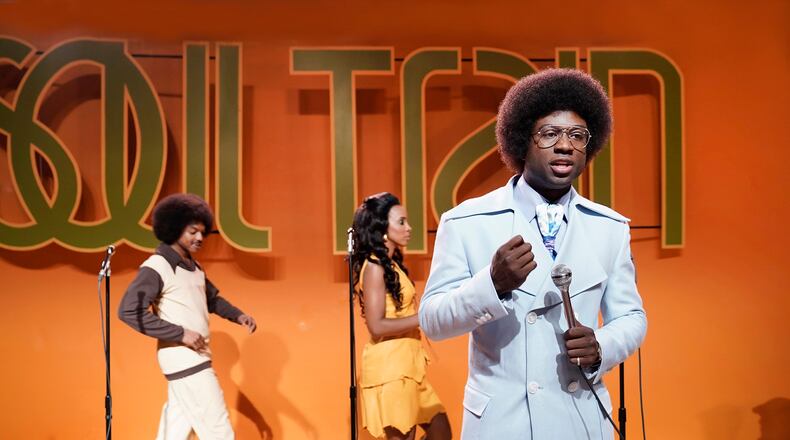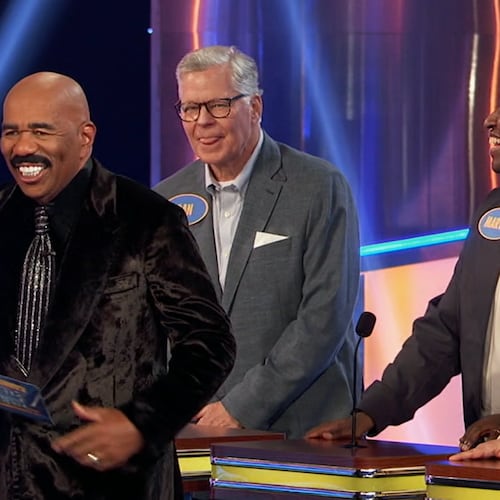Originally posted Sunday, February 3, 2019 by RODNEY HO/rho@ajc.com on his AJC Radio & TV Talk blog
Don Cornelius was a beloved man in black pop culture, a man who created a version of "American Bandstand" for his people, whose very soul is embedded into "Soul Train" itself.
Going back nearly five decades, BET recounts how Cornelius took the show national and turned it into a phenomenon while adding in fictional story lines about young, ambitious “Soul Train” dancers.
“American Soul,” shot in Atlanta but set largely in Los Angeles, debuts Tuesday with a two-hour launch.
Sinqua Walls ("Power"), channeling the hair, voice and presence of the real Cornelius, is two parts determination, one part pathos. Cornelius, a Korean War veteran, left his wife and two kids behind in Chicago to fulfill his dream, well aware it could tear his personal life apart.
And of course, he faced a skeptical world of white TV executives and advertisers not ready to accept him as an equal. Cornelius took his own life in 2012.
"I didn't know all the nuances he brought to the table as a man and character" going into the show, Walls said on the set of the show in December, dressed in character. He learned a lot from Cornelius' son Tony, an executive producer. He studied houses of classic episodes of Cornelius on "Soul Train."
Walls said he worked hard to capture Cornelius's essence but not ape him. "He was his own unique person," Walls said. "His hand motions, his rhythms, his cadences. I want to make his a character, not a caricature."
Cornelius, he said, had a certain way of elongating certain words like “cool” and “smooth.” “You leave ellipses in your speech,” Walls said.
Despite or because of Cornelius’ earlier failures, “Soul Train” brought the best out of him. “He had integrity,” Walls said. “He was a man of his word. And he was very driven.”
There is a key moment in the second episode where two of the younger dancers get into an argument on the set while they were taping. Walls as Cornelius plows into the crowd of teens and confronts them.
“I don’t know where you think you are but this ain’t the hood,” he said, angry but controlled. “You don’t rumble on my set. You make a mistake, you keep dancing. You break an ankle, you keep dancing. I don’t care if you have to [pee] in your pants, you keep dancing. We’ll cut around it. Are we clear?”
Potential advertisers watching in the wings signed on because he showed presence and demanded respect.
And while he faced his share of resistance from the white establishment, there were key white backers that supported him when they didn’t have to. “They didn’t try to change him,” he said. “They accepted him as his own man to do his work.”
Co-creator Devon Greggory said Cornelius' story alone would make a great biopic but to turn it into a series, he had to broad his horizons.
“My assistant said, ‘Make it ‘Mad Men with music,’” he said. “That show wasn’t just about Don Draper. That opened up my mind on what this could be.”
So he turned it into a story about “coming of age and finding your voice in the 1970s against the back drop of one of the greatest shows of African-American culture.”
He created Simone (Katlyn Nichol) and Kendall (Jelani Winston), a teen brother-sister team who wanted to be famous singers but also happened to be great dancers. They join "Soul Train" as a way to gain exposure and make connections. They are also part of a trio with Simone's boyfriend. J.T. (Christopher Jefferson), the "bad boy" who has a drugged-up mom and gets caught up in the Crips.
“You come for the music,” Winston said. “We hope you stay for the characters and stories.”
R&B star and Atlanta resident Kelly Price, an acting neophyte who took acting classes before winning the role, plays Simon and Kendall's overprotective mom who sacrificed her own music career for family.
Price, 45, said she is thrilled to just be able to re-live a show that she grew up with. As a child in the projects in Queens, she recalls dancing in front of the TV doing her own Soul Train line with her sisters. “There were only three of us so we’d line up the furniture as stand ins for other dancers,” she recalled.
She said her life came full circle after she landed her first album in 1998 and appeared on the original “Soul Train” then won Best New Artist in the 1999 Soul Train Awards.
Cornelius was still hosting at the time and he told Price he was a genuine fan.”This was such a huge deal,” she said. “I was his fan as a kid. He said my voice is amazing and people will remember me like Aretha and Gladys. When I won that award, I looked at him and he hugged me and I cried. I have real history with that man.”
The show will inject issues that continue to vex society today such as police brutality, feminism and racism.
But the show is just as much about the music. The set is a spanking replica of the original set, right down to the classic “Soul Train” sign, the bright colors and the vintage 1971-era cameras.
Some bg names came in to portray R&B stars of yore. In the first two episodes, Kelly Rowland plays Georgia native Gladys Knight as a woman balancing the needs of her record label and her own ambitions. A highlight of the second hour is Rowland's aching acoustic take on her most iconic song "Midnight Train to Georgia."
Michelle Williams, Rowland's former colleague with Destiny's Child, will show up later as Diana Ross. Wayne Brady will embody Little Richard. And Bobby Brown puts on a bald pate to play Rufus Thomas. (Sorry, Beyoncé is not Tina Turner. Actress Gabrielle Dennis gets the honors.)
Stylistically, “American Soul” is not “Empire” or “Star.” While there are soapy elements, the show errs on the of low-key realism. “We even toned down the afros,” Greggory said. “The shag carpet isn’t as thick.”
Price said she cried when she entered the “Soul Train” set because it brought back so many happy memories.
“The show mattered so much,” she said. “It was black and not watered down or dumbed down. It was cornrows and bold colors and afros and bell bottoms and stacked shoes. That’s what we wanted. Don presented us in our rawest, uncut, purest forms.”
By the way, if you want to see a fine documentary of “Soul Train,” VH1 aired one a few years back that’s available on YouTube:
TV PREVIEW
“American Soul,” debuting Tuesday, February 5, 2019 at 9 p.m. on BET
About the Author
Keep Reading
The Latest
Featured







